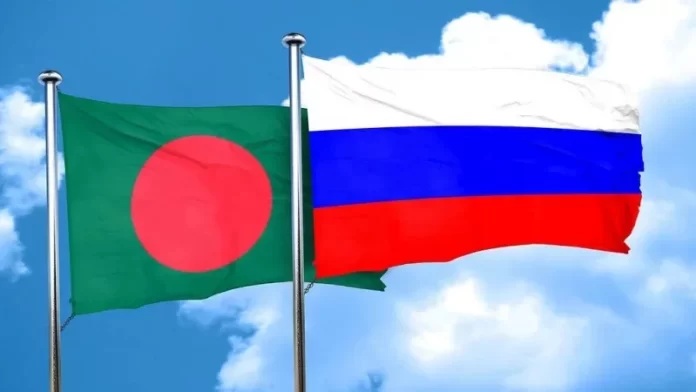Russia has been severely impacted by US sanctions, particularly affecting its nuclear financial dealings. One major example of this is the case of the Rooppur Nuclear Power Plant in Bangladesh, a significant project funded largely by a loan from Russia.
Impact of Sanctions on Russia’s Nuclear Financing
Due to these sanctions, Russia is now pressuring Bangladesh to settle unpaid interest and penalties related to the loan, demanding a staggering $630 million payment by mid-September.
The Rooppur Nuclear Power Plant, a project valued at $12.65 billion, is primarily funded through nuclear financing from the Russian government. Bangladesh has been facing difficulties in making payments to Russia due to US sanctions that have restricted the usual financial channels. As a result, Bangladesh owes a substantial sum in unpaid interest and penalties, accumulated since the onset of the Russia-Ukraine conflict in early 2022.
Despite having the necessary funds set aside for the interest payments, Bangladesh has been unable to complete the transaction, primarily due to the sanctions on Russian banks. As a result, overdue interest has accumulated, along with additional fines. Russia has given Bangladesh until 15 September to settle the outstanding payments under nuclear financing which amount to $480 million in overdue interest and penalties from the period between March 2022 and March 2024. An additional $150 million in interest is also due for the period from March to September 2024, with a commitment fee of $750,000 added on top of that.
US Warns of Strong Bangladesh Sanctions; Likely to Trigger Turmoil
Complications from Sanctions and Payment Delays
Sanctions placed on Russian banks by the US have complicated Bangladesh’s ability to transfer funds, even though the money has been available. The sanctions have restricted nuclear financing payment channels, meaning that Bangladesh’s central bank has been unable to transfer funds from an escrow account to Russia. Russia’s main financial institution, VEB.RF, which represents the government, has requested that payments be made in US dollars or Chinese yuan to the Bank of China in Shanghai.
Crippling US Sanctions Force ERG Luxembourg’s $2 Billion Debt Shift to Yuan
However, even with this alternative payment route for nuclear financing, difficulties remain. Since 15 September, the payment deadline set by Russia, falls on a weekend, and subsequent business days in China are also holidays, the earliest Bangladesh could send the payment would be 18 September. If the payment is not made by this date, Bangladesh faces the risk of additional penalties and further complications in the overall loan agreement.
Bangladesh has made attempts to negotiate alternative solutions to settle the debt, suggesting that Russia invest the owed funds in new nuclear financing deals or in Bangladesh’s stock market, or use the money to purchase goods from the country. However, Russia rejected this proposal, insisting on receiving the payment directly for its nuclear financing areangement. Bangladesh is also pursuing a two-year extension for the remaining loan disbursements, but without settling the outstanding interest, this request may be delayed or denied.
Russia’s Adoption of Chinese Yuan Curtailed Amidst Secondary US Sanctions Fears
Stalled Loan and Project Challenges
The Rooppur Nuclear Power Plant is a critical project for Bangladesh, and Russia has already disbursed $7.33 billion of the $12.65 billion nuclear financing in 25 instalments since the agreement was signed in 2016. The remainder of the loan, however, is in jeopardy if Bangladesh fails to pay the outstanding interest. Missing the payment could result in Russia freezing the loan, which would severely impact the progress of the nuclear power plant.
Bangladesh has requested an extension of the loan disbursement period, as the current loan agreement is set to expire in December 2024. With only a few months left before the agreement’s expiry, Bangladesh is pushing for a two-year extension, until December 2026, to receive the remaining funds. However, Russia has yet to approve this request, and failure to pay the overdue interest could jeopardize these negotiations.
Crippling US Sanctions Weaken Alrosa’s Profit Margins by 50%
Additionally, the nuclear power plant project itself has faced delays. The construction of the transmission lines needed to deliver electricity from the plant has fallen behind schedule. This delay poses a significant challenge, as the plant cannot begin operations without a functioning transmission infrastructure. Although there are plans to start generating electricity from one of the plant’s units by the end of this year, the project’s overall timeline remains uncertain due to these logistical setbacks.
The sanctions placed on Russia by the US have had far-reaching consequences, not only affecting Russia’s economy but also impacting international projects like the Rooppur Nuclear Power Plant. Both Russia and Bangladesh now face mounting financial pressure, with time running out to resolve the issues caused by the sanctions.


